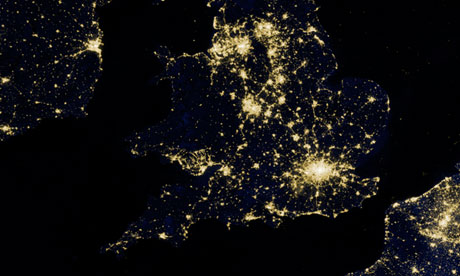
Lights on in the southern part of Britain, as seen by a satellite. Photograph: VIIRS/Suomi NPP/NASA
On Tuesday, MPs scrutinising the energy bill sink their teeth into the detail for the first time. The bill is pivotal to the UK's energy future, and ? as we will tell them when we give evidence ? a number of serious challenges face the MPs responsible for making it work.
This is a bill to keep the lights on while decarbonising our economy at an affordable price. And it matters for customers just as much as it matters for business. There is a still a long way to go before the bill becomes law, but some key questions already loom large as we get ready to deliberate the finer details.
Firstly, will the government be able to deliver on all of the responsibilities it is taking on itself? The powers in the Bill effectively give government the power to decide which generation technologies are built, at what scale, where, when and by whom. This is a remarkable amount of intervention, basically amounting to public sector procurement.
With this in mind, parliament will have to consider the government's track record on long-term procurement in areas such as private finance initiatives, defence contracts and rail franchises (the list could go on ?). It will also need to consider whether the new powers would allow too much scope for political intervention or procrastination in vital investment decisions. As someone who works for a company investing around ?4m a day in Britain, I am perhaps understandably nervous on this, given the track record in 2012.
Secondly, does the bill actually support utility investment at a reasonable cost? The UK energy utility sector is investing around ?10bn a year and this will need to increase over the next decade by around 50%. On the surface, the proposed contracts for differences (CfDs) seem attractive as they give investors a fixed price for the electricity they generate over the term of the contract. This, of course, depends upon the original price being reasonable (so government must drive a hard bargain on new nuclear with EDF) and this or a future government resisting the political temptation to tamper with the terms of the contracts.
But there is a third very serious point related to affordability which is not often mentioned. In the new world envisaged by the bill, suppliers will have to pay monies to a central body so that low carbon generators can be paid for their contracts every month. Effectively, the supplier has to guess the amount of low carbon electricity that will be generated in any given month - largely dependent on weather among other factors - as well as what the wholesale price of electricity will be in that month to work out how much they will need to pay. This means guessing how these two variables will interact.
Any supplier, big or small, will simply have to reflect this unpredictable and unmanageable cash flow volatility in their prices they charge customers unless the regime is very carefully designed. As well as pushing up prices, this could well increase the cost of capital for supply businesses and if we don't get this right it could force small suppliers out of the market, which will not be good for customers or innovation in the industry.
The last market structures were in place for the last 23 years and have kept the lights on. Will these new arrangements last to 2036 and beyond and keep the lights on throughout? I have my doubts.
? Ian Marchant is chief executive of SSE
Source: http://www.guardian.co.uk/environment/2013/jan/14/energy-bill-lights-on-key-questions
toysrus how to carve a turkey ipad 2 wal mart happy thanksgiving Macys Thanksgiving Day Parade 2012 Turkey Cooking Times
কোন মন্তব্য নেই:
একটি মন্তব্য পোস্ট করুন